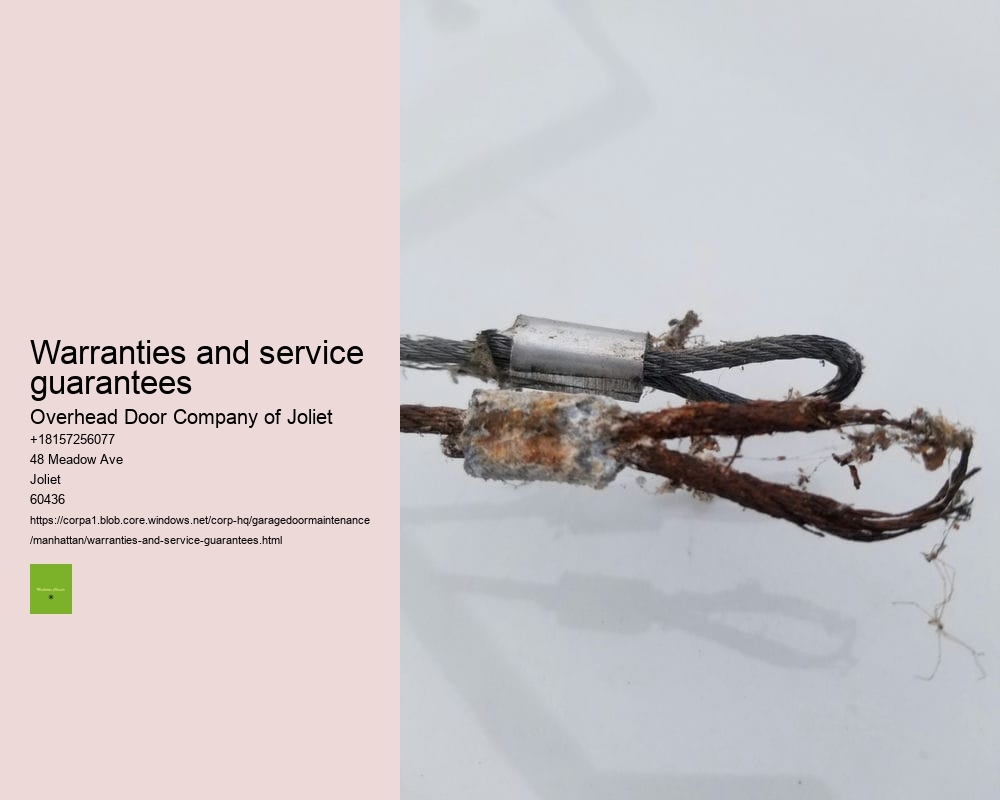

Warranties and service guarantees play a crucial role in consumer protection, ensuring that buyers receive products or services as promised. When discussing warranties, it’s essential to understand the distinction between express and implied warranties—two fundamental types that provide different layers of assurance.
Be aware of the door's weight when manually testing the balance Types of commercial garage doors customer. Contact professional technicians for any repairs that go beyond basic maintenance garage door track repair Manhattan joist. An express warranty is explicitly stated by the seller or manufacturer. This type of warranty can be found in written documents such as contracts, brochures, or even verbal agreements made during the sale. Express warranties clearly outline what is covered, for how long, and under what conditions. For instance, a car manufacturer might offer a five-year/60,000-mile warranty covering specific parts like the engine and transmission. These express warranties serve to build trust with consumers by providing transparent commitments regarding product performance and durability.
On the other hand, implied warranties are not written or spoken but are automatically assumed under law when goods are sold. These warranties ensure that products meet certain minimum standards of quality and reliability. There are two main types of implied warranties: the warranty of merchantability and the warranty of fitness for a particular purpose. The warranty of merchantability implies that an item will perform as generally expected by its nature; for example, a toaster should toast bread satisfactorily without malfunctioning shortly after purchase. Meanwhile, the warranty of fitness for a particular purpose arises when a buyer relies on the seller's expertise to select goods suitable for a specific use; if you tell a salesperson you need paint suitable for outdoor wood surfaces and they recommend one that fails quickly in those conditions, this implied warranty protects you.
While both express and implied warranties aim to safeguard consumer interests, they differ significantly in their application and scope. Express warranties are often more detailed and tailored to specific aspects of a product or service, offering clear recourse if something goes wrong within the specified period. Implied warranties provide broader but less explicit protections based on general expectations of quality and functionality inherent in commercial transactions.
Understanding these distinctions helps consumers make informed decisions about their purchases while also holding sellers accountable to fair standards. Whether through explicit promises outlined at the point of sale or assumed assurances embedded in everyday transactions, warranties reinforce confidence in market exchanges by guaranteeing that buyers get value consistent with reasonable expectations.
In summary, both express and implied warranties serve pivotal roles in maintaining trust between consumers and sellers. While express warranties offer clear-cut terms directly communicated to buyers, implied warranties provide foundational protections reflecting common-sense assumptions about product reliability. Together, they form a comprehensive framework ensuring fairness and satisfaction in commerce.
A warranty agreement serves as a critical safeguard for consumers, providing assurance and recourse in case a product or service does not meet expected standards. Understanding the key elements of such an agreement is essential for both providers and consumers to ensure clarity, fairness, and mutual protection.
First and foremost, the **coverage** section of a warranty agreement outlines what specific defects or issues are included under the warranty's protection. This might encompass parts, labor, or even replacement of the entire product. It is crucial that this section is detailed to prevent any ambiguity about what situations qualify for repair or replacement.
Closely related to coverage is the **duration** of the warranty. This specifies how long the protections last from the date of purchase. Durations can vary widely—ranging from 90 days for some electronics to several years for major appliances—and sometimes even offer lifetime guarantees. The duration sets clear expectations regarding how long consumers can rely on warranty support.
Another critical element is the **limitations and exclusions** clause. No warranty covers every possible scenario; thus, this part delineates what falls outside its scope. For example, damages resulting from misuse, accidents, unauthorized repairs, or normal wear and tear are typically excluded. By clearly stating these exceptions upfront, companies help manage consumer expectations and avoid potential disputes later on.
The **claim process** is another vital component that details how consumers should proceed if they need to use their warranty. This includes instructions on whom to contact (whether it be through phone calls, emails or visiting a service center), what documentation will be required (like proof of purchase), and any steps necessary before submitting a claim (such as troubleshooting). A streamlined claim process enhances customer satisfaction by making it easy and straightforward for them to obtain assistance when needed.
Additionally important is information concerning **remedy options**, which explains what actions will be taken once a defect has been confirmed under the warranty. Remedies may include repairing the defective item at no charge, replacing it with either a new or refurbished unit or issuing a refund equivalent to its current value. Clear articulation of these remedies helps ensure customers understand precisely what resolutions they are entitled to receive.
Moreover, many warranties feature a **transferability** clause indicating whether rights under the agreement can be transferred if ownership changes hands—for instance when selling second-hand products like used cars or electronics. Transferable warranties often add value since subsequent owners can still benefit from existing protections without needing entirely new agreements.

When it comes to running a business in Manhattan, every second counts.. Time is money, and any interruption in operations can spell disaster for your bottom line.
Posted by on 2024-06-21

When managing a commercial property in Manhattan, the functionality of your garage door is paramount.. A malfunctioning garage door can halt operations, compromise security, and pose safety hazards.
Posted by on 2024-06-21

When it comes to selecting the best service for commercial garage door repair in Manhattan, one of the most effective strategies is to speak directly with past clients.. This approach provides invaluable firsthand feedback on their experiences, helping you make a more informed decision.
In today's digital age, it's easy to get lost in online reviews and ratings.
Posted by on 2024-06-21

**Maintenance Challenges and Preventative Measures: Common Issues with Commercial Garage Doors in Manhattan**
Commercial garage doors are indispensable assets for many businesses in Manhattan, providing security, convenience, and protection.. However, like any mechanical system, they are prone to various issues that can disrupt operations and incur significant costs if not properly maintained.
Posted by on 2024-06-21
Offering service guarantees can be a game-changer for businesses, providing a multifaceted array of benefits that extend beyond mere marketing tactics. In an increasingly competitive market where consumers are inundated with choices, service guarantees serve as a powerful tool to attract and retain customers. They act as tangible demonstrations of a company's confidence in its products or services, thereby fostering trust and loyalty among consumers.
Firstly, service guarantees significantly enhance customer satisfaction. When customers know that they have recourse if something goes wrong, their apprehension diminishes. This assurance leads to increased customer confidence and allows them to make purchasing decisions more freely. For example, a company offering a money-back guarantee on its services is essentially telling the customer that their satisfaction is paramount, which can foster long-term loyalty.
Moreover, service guarantees can act as unique selling propositions (USPs) that differentiate a business from its competitors. In industries saturated with similar offerings, standing out becomes crucial. A robust service guarantee communicates not only quality but also accountability and reliability—qualities that are highly valued by modern consumers.
From an operational standpoint, offering service guarantees compels businesses to maintain high standards consistently. Knowing that any failure could result in financial repercussions encourages companies to optimize their processes and deliver top-notch services continually.

Consumer Rights and Protections under Warranty Laws
In a world where products range from everyday household items to complex technological gadgets, consumer rights and protections under warranty laws play a pivotal role in upholding fair trade practices and ensuring customer satisfaction. These legal provisions serve as a safety net for consumers, offering assurances that the products they purchase will meet certain standards of quality, durability, and performance.
At its core, a warranty is a promise made by the seller or manufacturer about the condition of a product. It serves as an implicit guarantee that the product will perform as advertised for a specified period. If it falls short due to defects or substandard workmanship within this timeframe, the consumer has recourse through repair, replacement, or even refunds. This assurance fosters trust between buyers and sellers and encourages commerce by reducing perceived risks associated with purchasing new products.
There are generally two types of warranties: express warranties and implied warranties. Express warranties are explicitly stated promises regarding the nature of the goods sold—these could be written or verbal guarantees provided at the time of sale. For example, an electronics company may offer a one-year express warranty on its smartphones, guaranteeing free repairs for any manufacturing defects within that year.